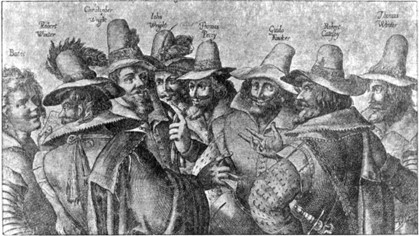Recusant was the name given to Roman Catholics and persons of other faiths who refused to attend Church of England services. The term was mainly introduced in an Act ‘for repression of Popish recusants to ensure loyalty of King James’ subjects’ after the Gunpowder Plot in 1605.
Legislation had been in place since 1558 but was not widely used against ‘Dissenters.’ In 1584, at the opening of parliament in the reign of Elizabeth I, a penalty of £20 was made payable ‘…by those who absented themselves from the Church of England for one month…’
At this time, refusing to go to church could mean a fine, imprisonment, property confiscation or, in extreme cases, execution. There were frequent references to the issue in Southam and in the wider society of Warwickshire. It affected the Throckmortons of Coughton Court, near Alcester, a recusant family who were Royalist sympathisers in the Civil War.
In Southam, the justices of the peace reported in 1682:
‘… Robert Betts and Mary his wife, Deliverance Fillingham, Joan wife of Ephrain Benson, Jane Spicer widow, Mary wife of William King, Dorothy wife of Francis Cox and Anne wife of Thomas Clarke, all of Southam, severally presented for not coming to church to hear divine service (fined).’
Evidence from the Overseers of the Poor accounts for 1673 reflects what could be expected of those who did not attend church on Sunday:
‘… A note of the moneys was made of the goodes that was distrained upon those persons that did absent themselves from the Church on the Lord’s Day in time of Divine service of the Lord God 1673 and alsoe how it was disposed of …’
The Dissenters continued with their defiance until late in 1684 when it was recorded that:
‘… William Harris of Radford, husbandman and his wife, William Harris of Byfield, Northampton, yeoman, Robert Harwood, yeoman and his wife, and Dorothy Taylor, spinster, all of Ladbroke, Anne Sabin of Harbury, widow, Deliverance Fillingham of Radford, widow, Robert Bett, husbandman, Ruth Butlin, spinster, and William Warren, husbandman, all of Southam, indicted for a riotous assembly at the parish of Southam (St James’s) under colour of exercising of religion in other manner than is established by the laws of this kingdom to the great terror of the people and disturbance of the peace of our lord the king that is now against the peace. (referred to the Quarter Sessions for judgement).’
The resulting fines for these Dissenters, received by the overseers of the parish of Southam, ranged from Robert Bett who had to pay £1 1s 0d, to Jane Benson who only had to pay 1s 0d. The fines totalled £5 3s 0d and were paid out (as was decreed by law) to the poor and distributed as bread on succeeding Sundays in the parish church.
Yet the fines did not seem to diminish the faith of the Dissenters as, in the January of 1685:
‘… Robert Bett, Ruth Butling, spinster, Jane Spicer, widow, Elizabeth Jefferyes widow and Dorothy wife of Francis Cox, all of Southam were again presented to the justices for not coming to church to hear divine service for three Sundays …’
The issue persisted until Catholics were granted freedom of worship by the Roman Catholic Relief Act of 1791.
The Gunpowder Plotters aroused suspicion of Catholics that persisted for two centuries.
Southam Heritage Collection is located in the atrium of Tithe Place opposite the Library entrance. We are open on Tuesday, Thursday, Friday and Saturday mornings from 10am to 12 noon. To find out more about Southam’s history, visit our website www.southamheritage.org telephone 01926 613503 or email southamheritage@hotmail.com You can also follow us on Facebook.


Leave A Comment